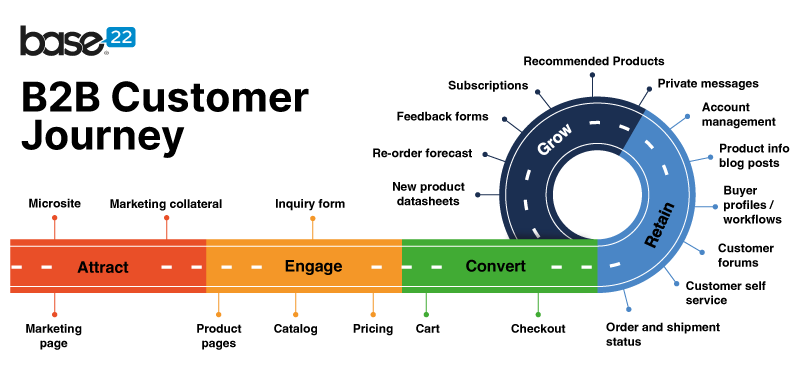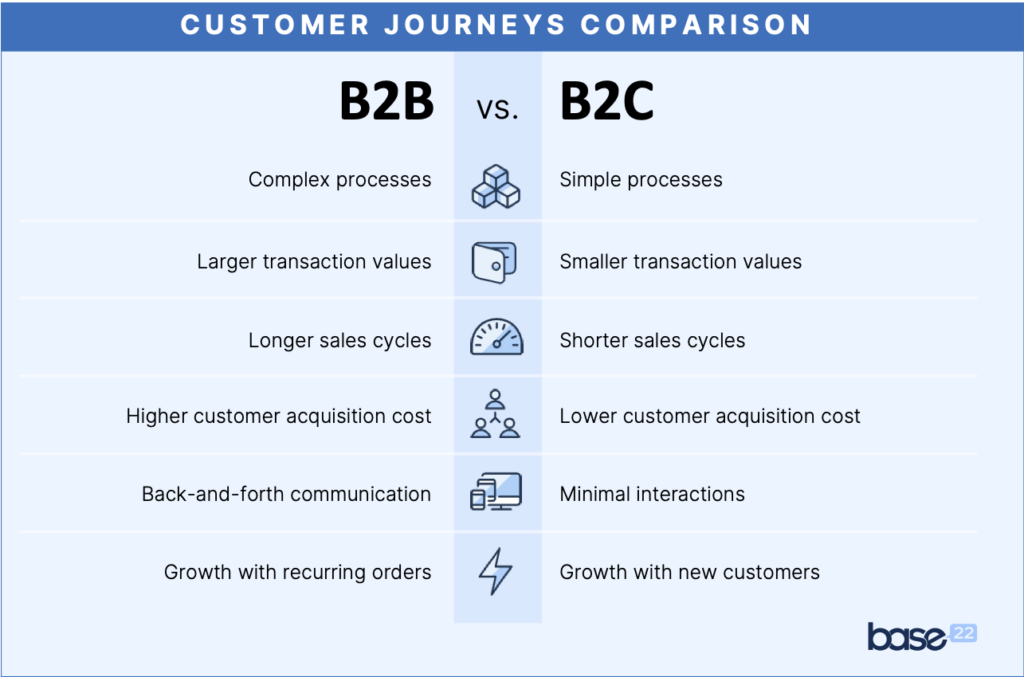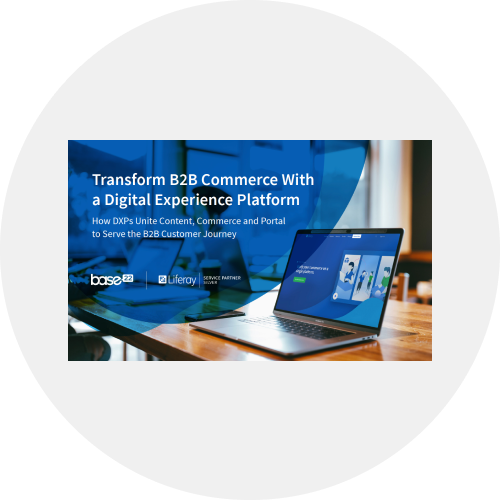B2B companies often operate under the assumption that digitizing their sales processes is challenging and complex. To a certain point, they are right. Managing e-Commerce products and platforms for distributors, brokers, wholesalers, and customers requires business-savviness and technical knowledge to manage the B2B Customer Journey through digital channels effectively.
However, with the B2B marketplace evolving at an unprecedented pace driven by Digital Transformation, a new stage has been set for the needs of sophisticated buyers: the match between enterprise, modern digital solutions, and the intricacies of B2B and complex business models. This evolution is redefining the buying experience and shaping the future of B2B customer experience (B2B CX). How can companies prepare and set for the long run of engaging with their multiple audiences toward growth without sacrificing time or competitiveness?
In this article, we take a deep dive into the B2B Customer Journey & the B2B Buying Experience, what it entails, how it differs from the B2C model, and the role of personalization. Furthermore, we highlight the best digital solutions to enhance the B2B Buying Experience with personalization.
The B2B Customer Journey vs. the B2B Buying Experience
The terms “B2B Customer Journey” and “B2B Buying Experience” are often used interchangeably, but they are two sides of a coin. The B2B Customer Journey refers to the entire process that a company undergoes when engaging with another business for a potential purchase. It includes all the touchpoints and interactions between buyers and seller: what the Marketing and Sales teams create and design to engage leads.
A complete journey usually looks like this:

On the other hand, the B2B Buying Experience, also known as B2B Buyer’s Experience or B2B Customer Experience (B2B CX), refers more specifically to the experience a company has while making a purchase. That is, the receiving end of the B2B Customer Journey: what actually happens. It encapsulates buyers’ total interactions and perceptions while engaging with a B2B company, from the initial contact to the post-purchase phase. Several factors, such as the quality of customer service, the efficiency of the sales process, the effectiveness of communication, and the usefulness of the product or service influence this experience. While the buying experience is a part of the overall customer journey, it is a narrower concept focusing on the transactional aspects of the customer’s interaction with the business.
The B2B Buying Experience is a complex process involving multiple decision-makers and touchpoints, extensive research, and, often, lengthy negotiation phases. More importantly, for each audience a B2B company has, there’s a unique B2B Buying Experience. While the main drivers could be similar, there could be slight differences between the duration of each stage or how relevant that stage is overall. For example: engaging a distributor is much harder than engaging a direct B2B customer via a website, but once the distributor makes a purchase and is satisfied, the pay-off will come in the form of recurring orders.

A Tailored DXP Solution for your Business Growth
Bring modern CX and automated processes to your B2B digital channels.
Learn moreDifferences Between B2B and B2C Customer Journeys
B2B Customer Journey: A Marathon
While B2B and B2C customer journeys share the common goal of satisfying the customer’s needs, they differ significantly in complexity, decision-making process, and relationship dynamics.
These are some of the characteristics of a B2B Customer Journey:
- Complex processes
- Larger transaction values
- Multi-tier decision making
- Longer sales cycles
- Recurring orders
- Back-and-forth communication previous to the purchase stage
- Sensitive document management related to purchases, such as contracts, invoices, and guarantees
- High customer acquisition cost
- The need for personalized solutions (custom products or services)
- Difficult to mass market (Attract stage)
- A lot of niche products and solutions
According to Gartner, 77% of B2B buyers feel that their recent purchases was very complex or difficult. And this is the most critical pain point that digital channels and technologies need to address when mapping and designing a user experience.
To deliver a rich B2B experience, your digital channels and solutions must be ready to support longer sales cycles—from 1 month to over six months. This setup involves designing multiple touchpoints, such as campaigns, reminders, and alerts, that can keep your brand on top of mind. It is like training for a marathon, the long run into conversion, and having the right tools to be precise and relentless.
B2C Customer Journey: A Sprint
In contrast, the B2C journey is typically more straightforward and closer to a sprint:
- Simple processes
- Shorter sales cycles
- Minimal interactions
- Lower customer acquisition cost
- Doesn’t rely on 2-way communication to make a purchase
- Priority on new user acquisition
- Sensitive to marketing efforts
B2C audiences are very responsive to marketing campaigns and influencers and can create big waves of sales in shorter times with the right viral video. However, the competition for B2C is very tough and requires faster responsive times and agility. Like a sprint, a company must be ready to fly and deliver value quickly, in a make-it-or-break-it approach.
The B2B Customer Journey is like a marathon, while B2C is more like a sprint. Because B2B and B2C are so different, having the right digital strategy and tools to support your business outcomes is key to success.

The Art of Personalization in the B2B Buying Experience
Personalization in the B2B Buying Experience refers to tailoring digital interactions and offerings to meet customers’ individual needs and preferences. It involves understanding the B2B Customer Journey, having insight into a lead’s industry, business challenges, and unique requirements, and delivering a tailored experience that adds value at every touchpoint.
Personalization leverages user attributes such as the following:
- Company size,
- industry or market,
- country,
- average order size, and
- time between orders,
- among others.
A superior solution (such as a B2B Commerce Portal) with a personalized B2B Buying Experience is a crucial differentiator in today’s competitive market. It can help a company retain customers, foster loyalty, and drive revenue growth through recurring orders. It enables the creation of targeted strategies that resonate with the buyer’s needs and preferences, including reminders to submit purchase orders or targeted campaigns to segments of existing customers.
Benefits of Personalized B2B Buying Experience
Personalizing the B2B Buying Experience through a robust, modern digital solution comes with numerous benefits:
- Enhanced Customer Relationships: Personalization fosters deeper relationships by showing customers their unique needs are understood and valued.
- Increased Sales and Revenue: A personalized buying experience can lead to larger deal sizes and increased customer loyalty, driving higher revenue.
- Improving Decision-Making: B2B buyers can make better-informed decisions with personalized insights and recommendations. This enhances their buying experience and increases their propensity to purchase, resulting in higher sales.
- Improved Customer Satisfaction and Retention: Personalization enhances customer satisfaction and encourages repeat business by meeting individual needs.
- Competitive Advantage: Companies that provide a personalized buying experience have a competitive edge in attracting and retaining customers.
- Exploring New Sales Opportunities: By building trust and a strong communication channel with your customer, new opportunities arise for upsell, cross-sell, partnerships, co-marketing efforts, and exploring new types of engagements.
While delivering an improved B2B buying experience is a must for thriving B2B companies, preparing and building a robust digital channel to deliver personalized digital experiences is an effort. The best way to do it? Leveraging Digital Experience Platforms (DXPs), as we will see below.

Transform B2B Commerce with a DXP
To stay competitive, companies must move beyond siloed commerce functionality. Learn how Digital Experience Platforms support your full B2B customer journey.
Learn moreDigital Experience Platforms: The Best Solution for B2B Customer Journeys
Considering that B2B buying groups are now conformed by newer generations—per TrustRadius—and that the B2B Buying Experience is not merely transactional nor linear, but integrated, it is important to choose the right software or platform for your digital B2B sales channels. As portal and platform experts, at Base22, we design and implement solutions by leveraging Digital Experience Platforms (DXPs), the best technology to enhance the B2B Buying Experience with personalization.
Tailored DXP solutions can support the B2B Customer Journey by offering personalized recommendations, simplifying navigation, and providing interactive content, elevating the overall resulting B2B Buying Experience.
Benefits of Tailored DXP solutions: B2B Portals
- B2B tools & features. DXPs offer capabilities such as content and experience management, interactive forms, customer analytics, e-commerce, content management, and integration with CRM and ERP systems. Plus, they have security certifications and programs and comply with enterprise technical requirements.
- Multiple solutions with one platform. DXPs can build and manage multiple portals and applications. With a single platform implementation, a company can leverage solutions such as a marketing site, a distributor portal, a partner portal, and a supplier portal with centralized, headless content.
- Personalization and audience manager. DXPs enable the marketing and sales team to cater content and campaigns to multiple audiences by leveraging user attributes, which allows B2B companies to tailor the buying experience to each customer’s unique needs and preferences.
- Omnichannel. Omnichannel interactions have become the new norm in the B2B sector. Tailored digital solutions can seamlessly integrate various online and offline channels providing a consistent and unified B2B buying experience.
- Support business growth. Tailored digital solutions can fuel business growth by streamlining operations, improving decision-making, and enhancing customer satisfaction. They facilitate efficient processes, provide valuable insights, and help businesses build stronger relationships—key ingredients for long-term success in the B2B sector.
According to McKinsey, the post-pandemic panorama shows more B2B buyers comfortable using digital channels to drive purchases or orders with higher transaction values, with transactions for over 50,000 USD. There are plenty of specialized DXPs for B2B use cases that are designed to be secure and flexible, provide automated workflows, facilitate authoring experience, and are ready to grow with your business. One such platform is Liferay, highlighted in Gartner’s Critical Capabilities for Digital Experience Platforms as a top platform for B2B and B2E experiences.

Final Thoughts: Modern Challenges of the B2B Customer Journey
The B2B Customer Journey and the B2B Buying Experience are critical aspects of business success in the digital age. By understanding and personalizing the journey, companies can build stronger customer relationships, increase sales, and gain a competitive advantage. By focusing on the experience, they can keep track of customer loyalty and satisfaction rates, and target specific KPIs for continuous improvement.
That being said, carefully considering your technical requirements, roadmaps, journeys, and business models is always in order. The B2B Buying Experience is becoming increasingly digital and personalized, but that doesn’t mean any solution could help you achieve growth. While standard e-Commerce products may quickly solve the need to digitize your sales processes, they may leave out essential moments or touchpoints to ensure healthy B2B relationships.
Choosing a solution tailored to your needs reduces this risk. Investing in a robust Digital Experience Platform to facilitate a personalized B2B Buying Experience is a strategic move for any B2B organization looking to excel in today’s competitive marketplace. In particular, platform-based B2B portals have all the features needed in a B2B or complex business model without the need to replace any system. With an experienced partner such as Base22, you can integrate your existing e-Commerce or ERP and build and manage personalized experiences for all your audiences through a single platform with agility.
Choose modern but choose well. Prepare for the long run with the right tools and partners to support your B2B Customer Journey. If you have an upcoming project related to digitizing or improving your B2B CX, drop us a line.


